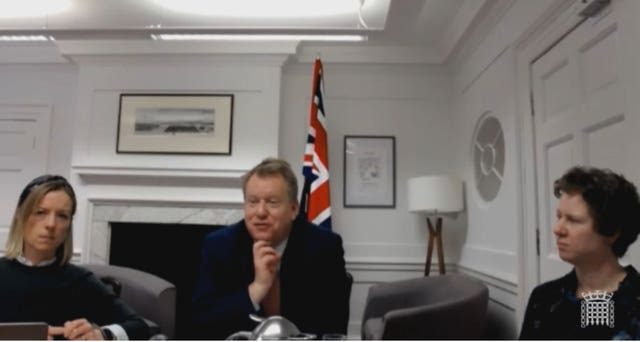The UK’s relationship with the European Union after Brexit could remain “bumpy” for some time, the Government admitted.
Brexit minister Lord Frost said he wanted the situation with Brussels to improve but highlighted ongoing problems with Northern Ireland’s post-Brexit arrangements.
The Tory peer told MPs that the ability to diverge from EU regulations would be one of the big prizes of leaving the bloc, but acknowledged this could cause further difficulties over the Northern Ireland Protocol.

He told the Commons European Scrutiny Committee that the relationship with Brussels “will be a bit bumpy for a time but there is a lot of business to be done” following the conclusion of the Trade and Cooperation Agreement between the UK and EU.
The Northern Ireland Protocol has been one of the early flashpoints in the UK-EU relationship following Brexit.
The protocol was designed to avoid a hard border on the island of Ireland but it has angered unionists by effectively creating a barrier for the supply of goods between Great Britain and Northern Ireland.
Under the deal, Northern Ireland is tied to a range of EU customs and regulatory rules, while the rest of the UK is intent on diverging from Brussels’ terms.
Lord Frost said businesses in Great Britain were having more problems than anticipated moving goods into Northern Ireland which was having “a bigger chilling effect than we thought”.
And he described an “unsettledness” in Northern Ireland.
He said: “Our assessment of the situation, or my assessment anyway, is that businesses and a good proportion of society in Northern Ireland feel anxious about the effects of the boundary – the trade boundary – between GB and Northern Ireland.”
Lord Frost said issues over the supply of a cancer drug highlighted the problems as he called for the EU to allow the protocol to operate in a “balanced and pragmatic way”.
Reports have indicated that Osimertinib, which was approved for use in lung cancer patients by British regulators, has been blocked from widespread use in Northern Ireland.
👇This is entirely incorrect. The Protocol, and the tailor-made solutions found in Dec 2020, ensure the continued availability of medicines in NI. How? There are derogations in EU law for NI, e.g. for market authorisation requirements. More info here: https://t.co/RAakkzOEn9 https://t.co/5VDTvR8xxe
— Daniel Ferrie 🇪🇺 (@DanielFerrie) May 14, 2021
The European Commission has said it is “entirely incorrect” to blame Brussels, arguing that the protocol and other arrangements “ensure the continued availability of medicines” in Northern Ireland.
But Lord Frost told MPs that “despite a little bit of dust thrown in the eyes by the EU” it was “clear that they are asserting their right to regulate cancer drugs in Northern Ireland rather than the UK doing that”.
“That sort of thing is going to be a problem if we can’t find pragmatic ways through it that protect our UK National Health Service.”
He added: “It’s absolutely clear that the people in Northern Ireland must have access to a broad range of medicines as people do everywhere else in the UK.”
In a Mail on Sunday article, Lord Frost warned that the Government continues “to consider all our options” as he said the situation caused by the Northern Ireland Protocol that he negotiated “cannot be sustained for long”.
That could mean triggering Article 16 of the agreement to suspend checks.
Although he refused to put a deadline on discussions with EU counterparts, he said there was a “real life timetable in Northern Ireland”.
He said: “Coronavirus restrictions are coming to an end, we all know that the late spring and summer in Northern Ireland can sometimes be turbulent, some days are significant in that, so we have to take that reality into account.
“We’ll always be willing to talk about anything whenever, but we also have a responsibility to try and avoid further deterioration and difficulties in that situation and that obviously is a possibility as we get into the spring and summer.”
Lord Frost said breaking away from the EU’s “regulatory orbit” was one of the key gains from leaving the bloc and vowed to pursue changes that were consistent with the deregulatory “spirit of Brexit”.
“One of the advantages we will get from Brexit is the opportunity to do things differently, that’s clear,” he told MPs.
“I don’t think we should accept that we are in the EU’s regulatory orbit for these purposes, we do need to develop our own ways of doing things and our own philosophy behind it.”




Comments: Our rules
We want our comments to be a lively and valuable part of our community - a place where readers can debate and engage with the most important local issues. The ability to comment on our stories is a privilege, not a right, however, and that privilege may be withdrawn if it is abused or misused.
Please report any comments that break our rules.
Read the rules hereLast Updated:
Report this comment Cancel